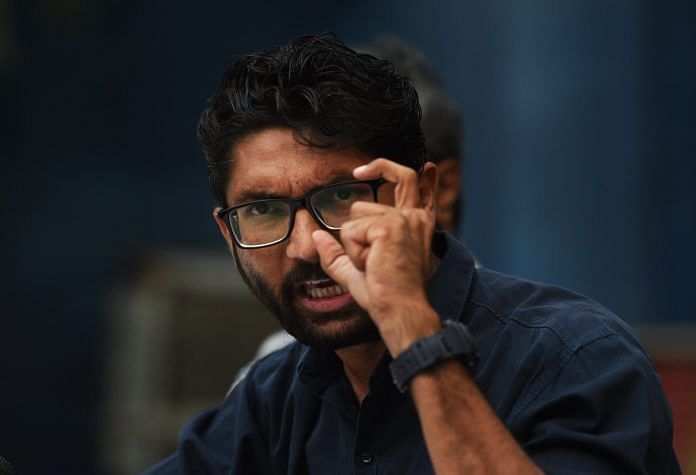Gujarat independent MLA and Dalit leader Mevani said it has been RSS-BJP’s long-pending agenda to end reservation based on caste system.
Kolkata: Gujarat independent MLA and Dalit leader Jignesh Mevani said Sunday that the Centre’s move to provide 10 per cent quota to upper caste poor is a step towards realizing the RSS-BJP’s agenda to remove caste-based reservations from the system.
President Ram Nath Kovind Saturday gave his assent to the constitutional provision to provide 10-per cent reservation in government jobs and education to economically backward section in the general category. The bill was passed by the Parliament on 9 January.
“I am apprehensive and so are the members of the Scheduled Caste/ Scheduled Tribe and Other Backward Class that this is the first step towards putting an end to the reservation on the ground of socio-educational deprivation.
“It has been a long-pending agenda of the RSS-BJP to discard the Constitution and end reservation based on caste system,” Mevani said on the sidelines of a programme here.
The Independent MLA also said that the quota system was introduced in the country to give representation to socially and educationally backward people, it wasn’t meant to end poverty.
“We have absolutely no issues with the poor people from the other communities getting any benefit. But reservation is not meant to remove poverty.
“It is meant to give representation to SC/ST/OBC people, who on account of the society’s caste structure, have remained socially and educationally backward,” he said.
Congratulating BSP supremo Mayawati and SP supremo Akhilesh Yadav for stitching an alliance in Uttar Pradesh against the BJP, Mevani said the other opposition parties should also take cue from the coalition and make efforts for maximum polarisation of anti-BJP votes. –PTI







People who were born a mere thirty years ago and easily obtained free education, are now claiming that SC/ST/OBC have been deprived of educational opportunities for centuries!!! Consider the North East where a majority is classified as ST and where Hindus hardly exist. Who prevented the NE people from education? Nobody. Even today, with SC/ST/OBCs ruling the nation, more than 50% of the school students do not go to college. Who is stopping them? Nobody. If in this modern age, with thousands of colleges and lakhs of college seats, people are not entering college, what could be the actual status of education a thousand years ago, five hundred years ago or a even a hundred years ago? Why reservation is now needed in Kerala with 100% literacy?
“Centuries of education denial” is just a copy paste job of a fraudulent campaign that started more than a 100 years ago. Is there any evidence in the past three hundred years of any law existing at all India level that prevented anybody from obtaining education? What was the level of education and what educational opportunities existed say a thousand years ago, five hundred years ago or even a hundred years ago?
I don’t think that is strictly correct. It would be political hara kiri for any party to attempt to undo reservation for SC / ST. What this belated reservation of 10% for the poor in the general category attempts is to redress a balance, although it must face legal challenge in the apex court. Dalits are only tangentially a more promising group to tap for the party than Muslims are. So it starts with virtually no hold over one third of the population. While Dalits and Muslims are not monolithic voting blocs, their marginalisation – once historic, the other more recent – means that they do think deeply about their future in a potentially majoritarian society.